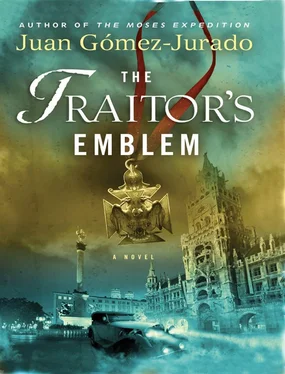Juan Gomez-Jurado - The Traitor's emblem
Здесь есть возможность читать онлайн «Juan Gomez-Jurado - The Traitor's emblem» весь текст электронной книги совершенно бесплатно (целиком полную версию без сокращений). В некоторых случаях можно слушать аудио, скачать через торрент в формате fb2 и присутствует краткое содержание. Жанр: Триллер, на английском языке. Описание произведения, (предисловие) а так же отзывы посетителей доступны на портале библиотеки ЛибКат.
- Название:The Traitor's emblem
- Автор:
- Жанр:
- Год:неизвестен
- ISBN:нет данных
- Рейтинг книги:4 / 5. Голосов: 1
-
Избранное:Добавить в избранное
- Отзывы:
-
Ваша оценка:
- 80
- 1
- 2
- 3
- 4
- 5
The Traitor's emblem: краткое содержание, описание и аннотация
Предлагаем к чтению аннотацию, описание, краткое содержание или предисловие (зависит от того, что написал сам автор книги «The Traitor's emblem»). Если вы не нашли необходимую информацию о книге — напишите в комментариях, мы постараемся отыскать её.
The Traitor's emblem — читать онлайн бесплатно полную книгу (весь текст) целиком
Ниже представлен текст книги, разбитый по страницам. Система сохранения места последней прочитанной страницы, позволяет с удобством читать онлайн бесплатно книгу «The Traitor's emblem», без необходимости каждый раз заново искать на чём Вы остановились. Поставьте закладку, и сможете в любой момент перейти на страницу, на которой закончили чтение.
Интервал:
Закладка:
Ilse opened her eyes. They were red and swollen.
“No…”
“Who, then? Did you recognize them?”
Ilse raised a trembling hand to her son’s face, stroking it gently. The tips of her fingers were cold. Overwhelmed by pain, Paul knew that this would be the last time his mother touched him, and he was afraid.
“It wasn’t…”
“Who?”
“It wasn’t Jurgen.”
“Tell me, Mama. Tell me who. I’ll kill them.”
“You shouldn’t…”
Another attack of coughing cut her short. Ilse’s arms fell limply to her sides.
“You shouldn’t hurt Jurgen, Paul.”
“Why, Mama?”
His mother was fighting for every breath now, but she was fighting on the inside too. Paul could see the struggle in her eyes. She had to make a huge effort to get air into her lungs. But even more of an effort to force these three last words from her heart.
“He’s your brother.”
40
Brother.
Sitting on the curb, close to where the landlady had sat an hour earlier, Paul tried to digest that word. In less than thirty minutes his life had been turned upside-down twice-first with the death of his mother, and then with the revelation she’d made with her final breath.
When Ilse died, Paul had embraced her and was tempted to allow himself to die too. To stay where he was until the flames consumed the ground beneath him.
That’s life. Running across a roof that’s condemned to collapse, thought Paul, drowning in a pain that was as bitter, dark, and thick as oil.
Was it fear that had kept him on the roof in the moments after his mother’s death? Perhaps he had been afraid of facing the world alone. Perhaps if her last words had been “I love you so much,” Paul would have let himself die. But Ilse’s words had given a completely different meaning to the questions that had tormented Paul all his life.
Was it hatred, the thirst for vengeance, or the need to know, that had finally made him act? Perhaps a mixture of all three. What is beyond doubt is that Paul gave his mother a final kiss on the forehead, then sprinted to the opposite end of the roof.
He nearly fell over the edge but managed to stop himself in time. The children next door sometimes played on the building, and Paul wondered how they got back across. He deduced that they probably left a plank of wood lying around somewhere. Paul had no time to look for it amid the smoke, so he took off his overcoat and jacket, reducing his weight for the jump. If he missed, or if the opposite bit of roof collapsed under his weight, he would drop five floors. Without thinking too much, he had taken a running jump, blindly confident that he would make it.
Now that he was back at ground level, Paul tried to assemble the puzzle in which Jurgen-my brother!-had become the most complex piece of all. Could Jurgen really be Ilse’s son? Paul didn’t think it possible, as only eight months separated their birth dates. Physically it was possible, but Paul was more inclined to believe that Jurgen was Hans and Brunhilda’s son. Eduard, with his darker, rounder complexion, had looked nothing like Jurgen, nor were they alike in temperament. However, Jurgen did resemble Paul. They both had blue eyes and pronounced cheekbones, though Jurgen’s hair was darker.
How could my father have slept with Brunhilda? And why did my mother hide it from me all this time? I always knew she wanted to protect me, but why not tell me this? And how am I supposed to find out the truth without approaching the Schroeders?
The landlady interrupted Paul’s thoughts. She was still sobbing.
“Herr Reiner, the firemen say the fire’s under control, but it’ll be necessary to demolish the building, as it’s no longer safe. They’ve asked me to tell the tenants that they can take turns to go in and fetch some clothes, as you’ll all have to spend the night elsewhere.”
Like a robot, Paul joined the dozen people who were going to recover some of their things. He stepped over the hoses that were still pumping arcs of water, walked along the sodden corridors and stairways accompanied by a fireman, and finally reached his room, where he picked out clothes at random and put them into a small bag.
“That’s enough,” urged the fireman, who had been waiting uneasily in the doorway. “We have to go.”
Still dazed, Paul followed him. But a few meters later, a faint idea flickered in his brain, like the edge of a gold coin in a bucket of sand. He turned and ran.
“Hey, listen! We’ve got to get out!”
Paul ignored the man. He ran into his room and dove under his bed. In the narrow space he struggled to move aside a pile of books he’d put there to hide what was behind.
“I told you to get out! Look, it isn’t safe here,” said the fireman, pulling on Paul’s legs till his body appeared.
Paul didn’t mind. He had what he’d come to get.
A black mahogany box, smooth and plain.
It was nine thirty at night.
Paul took his small bag and ran across town.
If he hadn’t been in such a state, he would undoubtedly have noticed that something was going on in Munich, something greater even than his own tragedy. There were more people around than usual for that time of night. The bars and taverns were heaving, and angry voices emerged from inside. Anxious men huddled in groups on street corners, and there wasn’t a single policeman in sight.
But Paul paid no attention to what was going on around him; he just wanted to cover the distance that separated him from his goal in as little time as possible. Right now it was the only clue he had. He cursed himself bitterly for not having seen it, for not having worked it out sooner.
Metzger’s pawnshop was closed. The doors were thick and solid, so Paul didn’t waste any time knocking. Nor in calling out, even though he assumed-correctly-that an avaricious old man like the pawnbroker would live on the premises, perhaps in a rickety old bed in the back of the shop.
Paul put his bag down by the door and looked around him for something solid. There were no loose paving stones, but he found a dustbin lid the size of a small tray. He picked it up and threw it at the shop window, which shattered into a thousand pieces. Paul’s heart was jumping out of his chest and pounding in his ears, but he ignored that too. If anyone called the police, they might arrive before he got what he’d come for; but then again, they might not.
I hope not, thought Paul. Otherwise I’ll run off, and the next place I’ll be going for answers will be the Schroeder mansion. Even if my uncle’s friends send me to prison for the rest of my life.
Paul leapt inside. His shoes crunched on the blanket of glass shards, a mixture of the bits of broken window, and a Bohemian crystal dinner service that had also been smashed by his projectile.
It was pitch-black inside the shop. The only light came from the back room, where he could hear loud shouts.
“Who’s there? I’m calling the police!”
“Go ahead!” Paul shouted back.
A rectangle of light appeared on the floor, throwing into relief the ghostly shapes of the pawnshop wares. Paul stood there in the middle of them, waiting for Metzger to emerge.
“Get out of here, damned Nazis!” shouted the pawnbroker, appearing in the doorway, his eyes still half closed from sleep.
“I’m not a Nazi, Herr Metzger.”
“Who the hell are you?” Metzger came into the shop and switched on the light, checking that the intruder was alone. “There’s nothing of any value here!”
“Perhaps not, but there’s something I need.”
The old man’s eyes came into focus at that moment and he recognized Paul.
“What are you… Oh.”
“I see you remember me.”
“You were here recently,” said Metzger.
Читать дальшеИнтервал:
Закладка:
Похожие книги на «The Traitor's emblem»
Представляем Вашему вниманию похожие книги на «The Traitor's emblem» списком для выбора. Мы отобрали схожую по названию и смыслу литературу в надежде предоставить читателям больше вариантов отыскать новые, интересные, ещё непрочитанные произведения.
Обсуждение, отзывы о книге «The Traitor's emblem» и просто собственные мнения читателей. Оставьте ваши комментарии, напишите, что Вы думаете о произведении, его смысле или главных героях. Укажите что конкретно понравилось, а что нет, и почему Вы так считаете.












